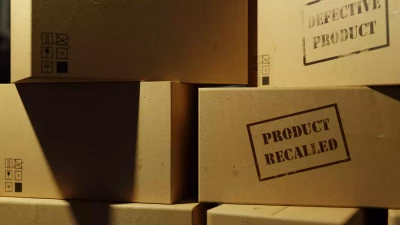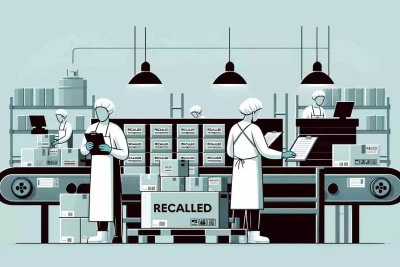How Traceability Rules Will Transform the Supply Chain
October 22, 2024
 The supply chain is about to experience a significant transformation thanks to the Food Safety Modernization Act (FSMA) 204 rule, set to take full effect by January 2026. With increasingly complex regulatory requirements and the need for seamless traceability, the food industry must act swiftly to adapt. These changes will not only improve public safety but also reshape how companies approach recalls and compliance. They also mean dramatic changes are on the way for brokers, food distributors, retailers, and restaurants.
The supply chain is about to experience a significant transformation thanks to the Food Safety Modernization Act (FSMA) 204 rule, set to take full effect by January 2026. With increasingly complex regulatory requirements and the need for seamless traceability, the food industry must act swiftly to adapt. These changes will not only improve public safety but also reshape how companies approach recalls and compliance. They also mean dramatic changes are on the way for brokers, food distributors, retailers, and restaurants.
Product recalls have skyrocketed in recent years. In 2018 alone, there were 118 food recalls. If current trends continue, 2024 is on pace to top that record. Recalls are not just costly—they also have a lasting impact on consumer trust. More than 50% of consumers avoid recalled products, and 15% never buy from the brand again. This trend underscores the need for tighter control and traceability throughout the supply chain to minimize exposure and losses.
For example, Chipotle experienced heavy fallout following a series of food safety issues, resulting in a $25 million fine and a deferred criminal prosecution. Cases like this highlight the new accountability companies face—not just through financial penalties but through legal consequences, which FSMA 204 aims to formalize across the food supply chain.
“We have a very fractured supply chain. It moves pretty quick, but it’s still fractured,” says PLM Fleet’s Don Durm of the challenges related to traceability. “There’s lots of handoffs. Brokers buy and sell things while product is moving.”
FSMA 204 introduces enhanced traceability requirements for certain foods to improve recall precision and limit public exposure to unsafe products. One key aspect of the rule is the requirement for companies to maintain sortable, digital records for up to two years. These records must be accessible to the FDA within 24 hours of a recall request. The scope extends from food manufacturers and distributors to convenience stores, grocery chains, and restaurants, even covering individual ingredients of prepared foods.
What should your company do to prepare before FSMA 204 takes effect? Gain insights from leading supply chain experts in the latest episode of the Stay In Your Lane Podcast.
Imagine ordering a hamburger at a restaurant—FSMA 204 requires traceability not only for the meat but also for the lettuce, cheese, and tomato. Every ingredient must have a lot number stored and accessible, ready for immediate reporting in the event of a recall.
“FSMA 204 is the first attempt to modernize the supply chain,” says Durm. “Now you can focus in exactly on what you need to recall and stop it.”
Meeting FSMA 204 requirements will demand technology-driven solutions. RFID systems are emerging as a critical tool for seamless tracking, as they allow companies to monitor goods without direct line of sight. These sensors can capture data as products pass through warehouse portals, providing real-time updates on shipments down to the case level.
Another benefit is that digital records can help minimize the scope of recalls. By pinpointing exactly which batches are affected, companies can target specific products instead of pulling entire lines, saving millions. On average, a food recall costs around $10 million, but precise traceability can significantly reduce that financial burden.
As traceability improves, companies will also need to address operational challenges, particularly within warehousing. Many warehouses struggle with maintaining high pick accuracy, with discrepancies between perfect pick rates (94%) and perfect delivery rates (82%). This gap often results from labeling errors or data mismanagement.
 Cold storage facilities in particular face staffing difficulties due to harsh working conditions. With better tracking technologies, companies can reduce the reliance on highly skilled labor by making it easier for less experienced workers to achieve higher pick accuracy. Incentive programs tied to performance, such as bonuses for high pick rates, are already helping to address manpower challenges and ensure smooth operations.
Cold storage facilities in particular face staffing difficulties due to harsh working conditions. With better tracking technologies, companies can reduce the reliance on highly skilled labor by making it easier for less experienced workers to achieve higher pick accuracy. Incentive programs tied to performance, such as bonuses for high pick rates, are already helping to address manpower challenges and ensure smooth operations.
The complexity of FSMA 204’s rollout has left many companies wondering how they will manage the transition. Unlike past regulations, this rule does not include a phased implementation. Instead, companies across the supply chain—from manufacturers to retailers—must be ready to comply by January 2026. With no grace period or extensions guaranteed, those who fall behind risk steep fines and reputational damage.
FSMA 204 marks a turning point in the way supply chains operate. Enhanced traceability will offer long-term benefits, but it requires proactive investment in technology and workforce training to navigate the transition effectively. While the learning curve may be steep, companies that embrace these changes will not only comply with regulations but also gain a competitive edge in an increasingly transparent market.
“January 2026 is coming up soon. They’ve never really done a ‘rip the Band-Aid off’ approach like this before,” warns Durm.
The countdown to FSMA 204 is underway, and the time to act is now. Companies should begin auditing their traceability practices, implementing new technologies like RFID, and training staff to meet the new standards. Those who are proactive will not only avoid penalties but also improve operational efficiency and build consumer trust.
This regulatory shift will reshape the supply chain for the better, making it safer, faster, and more resilient. At Triple T Transport, we are committed to helping our partners adapt to these changes and prepare for a future where compliance and innovation go hand in hand. Contact us today to learn more about our industry-leading 3PL services.














